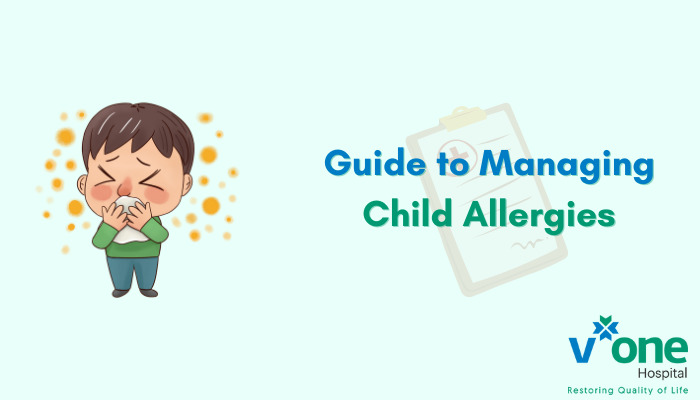A Parent’s Guide to Managing Child Allergies: Happy, Healthy Kids
As a parent, your child will always be one of your top priorities. It’s your job to make sure they are healthy and safe. And for a child with allergies, you need to be extra careful and vigilant, especially since a relative may unknowingly feed them something that they are allergic to, or that they may eat something at school or at a friend’s house that just isn’t the best idea for them.
If your child has allergies, managing their symptoms can be a challenging task, but it’s important to know how to manage your child’s allergies. While we may say things like “It’s just an allergy”, the consequences are definitely not as mild. Allergies can cause a wide range of symptoms, from sneezing and itching to difficulty breathing, and can impact your child’s quality of life. But as a parent, with the right tools and resources, you can manage your child’s food allergies or seasonal allergies effectively.
Identify Your Child’s Allergies
The first step in managing your child’s allergies is to identify the specific allergens that trigger their symptoms- understanding what they are allergic to and how their allergies affect them. This can be done through allergy testing, which can be done through a skin test or blood test by an allergist.
Allergies happen when the immune system overreacts to a normally harmless substance, such as pollen, dust, or certain foods. Common symptoms of allergies include a runny nose, itchy eyes, coughing, sneezing, and skin rashes. In severe cases, allergies can cause anaphylaxis, a life-threatening reaction that requires immediate medical attention. Keep a record of your child’s symptoms and when they occur and speak with your child’s pediatrician or an allergy specialist to get a clear understanding of your child’s specific allergies and how to manage them.
Minimize Exposure to Allergens
One of the most effective ways to manage your child’s allergies is to keep them away from the allergens. This can include avoiding certain foods, such as peanuts or shellfish, or keeping pets out of the house if your child is allergic to animal dander. Keep the house clean and dust-free, and avoid pet dander and mold. Use high-efficiency particulate air (HEPA) filters in your home to remove allergens from the air. You can also wash your child’s bedding and stuffed animals in hot water weekly to eliminate dust mites.
If your child is allergic to pollen, keep your windows and doors closed during peak pollen season, use air conditioning, and avoid outdoor activities during high pollen count days. If your child is allergic to certain foods, read labels carefully, and avoid cross-contamination during meal preparation.
Educate Your Child
Once you’ve identified your child’s allergies, it’s essential to educate yourself and your child about them. Teaching your child about their allergies can help them take responsibility for their health and avoid situations that could trigger an allergic reaction. Teach them how to identify the symptoms of an allergic reaction. Make sure they understand the importance of carrying their medication, how to use it, and what to do in case of an emergency.
Teach your child how to avoid allergens and recognize the symptoms of an allergic reaction. Encourage them to ask questions about the ingredients in their food and to tell an adult if they’re feeling unwell. Also, educate your child’s teachers, caregivers, and other family members about your child’s allergies and how to manage them. It’s vital that everyone who cares for your child understands their allergies and knows what to do in case of an allergic reaction.
Create an Allergy Management Plan
Allergic reactions can range from mild symptoms like a runny nose to severe reactions like anaphylaxis, which can be life-threatening. And while you will do your best to keep your child safe, accidents may still happen.
An allergy management plan is a document that outlines the steps you should take if your child has an allergic reaction. This plan should include information on what to do in case of an emergency, as well as steps to prevent allergic reactions from occurring. It outlines your child’s allergies, the symptoms of an allergic reaction, and how to manage it. It should also include emergency contact information and the location of your child’s medication. Make sure to share this plan with anyone who cares for your child, including family members, teachers, and childcare providers. Review the plan regularly and update it as needed.
Consider Medications
In some cases, you’ll need medication to manage your child’s allergies. Antihistamines can help relieve symptoms such as sneezing, itching, and runny nose. Decongestants are good for nasal congestion, and nasal corticosteroids can reduce inflammation in the nasal passages.
It’s important to have medication on hand to manage the symptoms. Whether it’s antihistamines, epinephrine auto-injectors, or inhalers, make sure that medication is easily accessible and that anyone who cares for your child knows how to use it.

